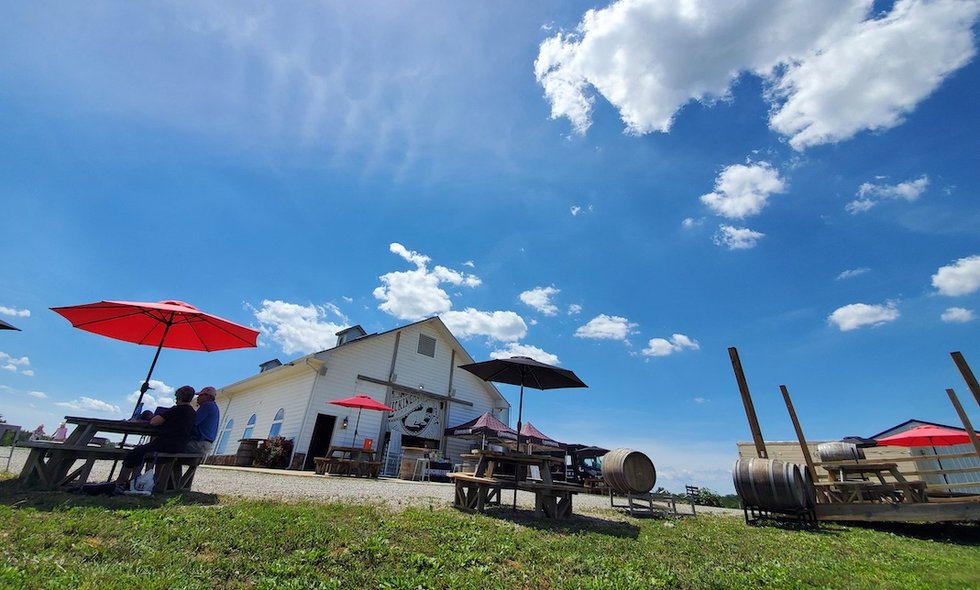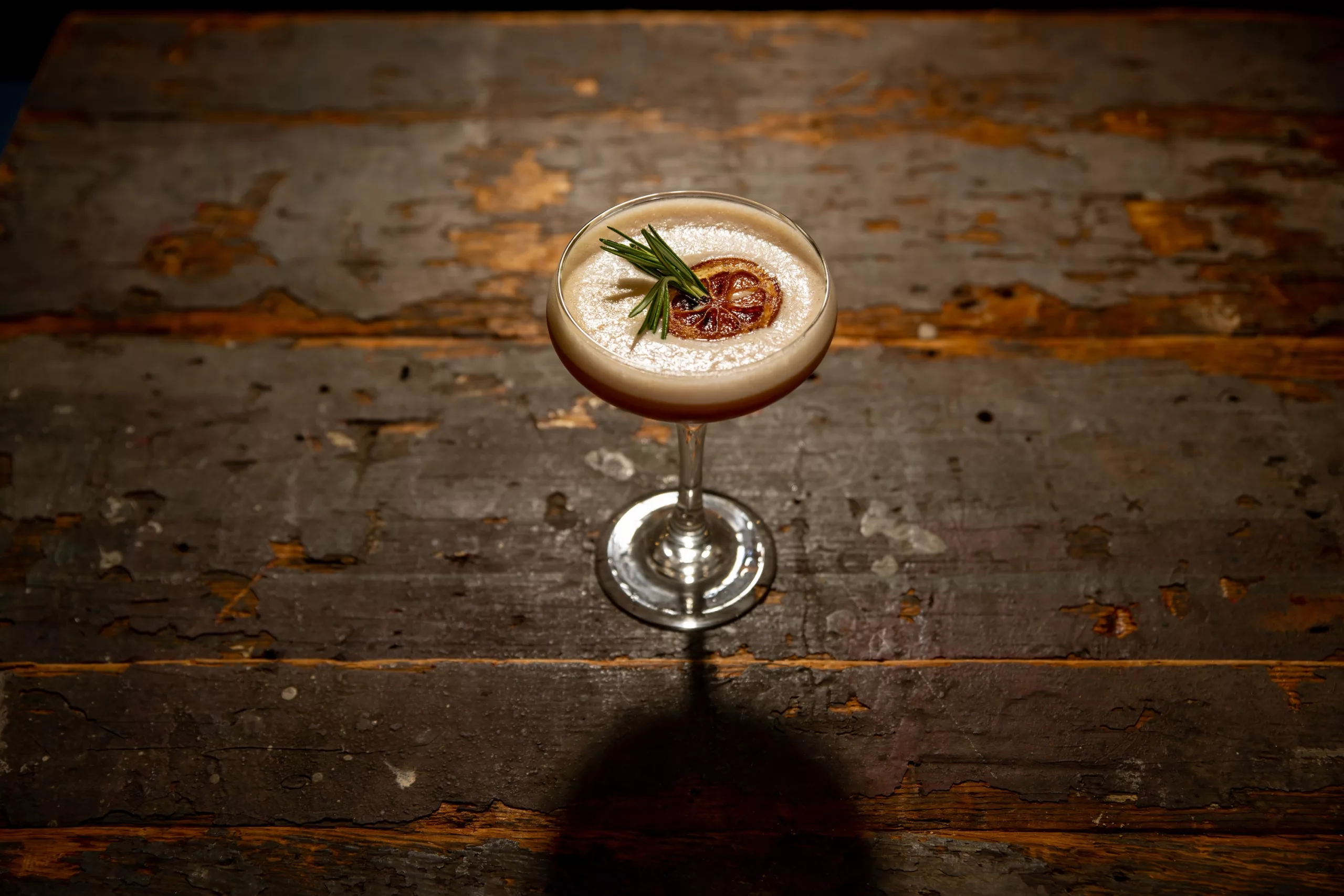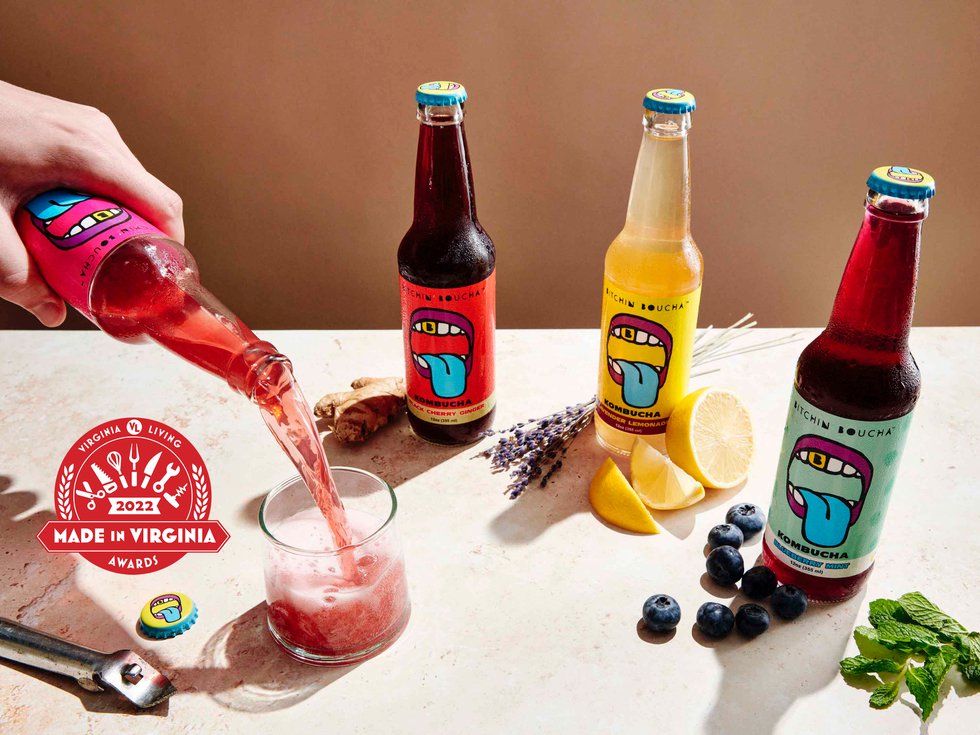
Lickinghole Creek Craft Brewery in Goochland.
Growing the ingredients yourself guarantees your craft beer is truly local.
The farm to table movement started more than 20 years ago, celebrating seasonal and local food as its central tenet. It took a little longer for the beer industry to catch up. But with the growth in craft brewing over the past 10 years has come a new phenomenon, “farm to bottle” operations, where breweries grow or locally source many of the ingredients to make beers that celebrate and incorporate seasonality and a local “terroir” into their production cadence. In 2014, the passage of SB 430 codified in law the ability for farms to operate breweries on their properties, opening up opportunities for diversification for small farms through agritourism. There are a now a host of breweries around the state that pride themselves on using fresh local ingredients to make their beer. The Virginia Craft Brewer’s Guild, overseen by director Brett Vassey, was established in 2010 to help create a good environment for independent craft beer businesses to operate and flourish. One of their four standing committees, the Farm Brewery Committee, focuses on “protecting the rural character of Virginia and promoting agricultural resources for brewers,” according to Vassey. The organization has helped invigorate farm breweries as well as support farms and growers who provide their products for use by brewers, giving their beers their local flavors and tie to the local communities.
Here are a few of our favorites around the state.
Dirt Farm Brewing

Dirt Farm Brewing cherry trees and Tart 31 Cherry Ale.
Nestled in the Blue Ridge Mountains in western Loudon County, Bluemont’s Dirt Farm Brewing affords gorgeous views of surrounding farms and, on a clear day, the distant corporate world of Tyson’s Corner way to the east. Owned by Janell and Bruce Zurschmeide, it’s one piece of a multigenerational farming family business that also includes a winery, a cidery, a farm stand, and a CSA. With a diversified model, each business helps support the others and mitigates the risks of bad weather and other farming woes. Bruce learned fermentation in their winery and has been farming for more than 25 years. As they ramped up their brewery operations, they got some know-how from Lickinghole Creek in Goochland.

Lemon grass at Dirt Farm Brewing.
Dirt Farm Brewing was the first brewery in Virginia to produce a 100 percent Virginia beer with all local ingredients, and many of their beers are created with products from the farm, following the seasons. Strawberry hefeweizen is followed by their iconic Tart Cherry Ale, Som Peach, and Sweet Potato Stout. They’ve made beer from lemongrass and kale, and their clean-the-freezer gleaning special Fustercluck includes apricots, strawberries, and Norton grape must.
Their beer is only available onsite, and that’s a good thing, because the trip is well worth it. In addition to a great view and tons of beer, they have a scratch cooking food truck that puts out Southwest steak tacos, Korean pork lettuce wraps, and hot honey chicken wings. DirtFarmBrewing.com
Lickinghole Creek

Lickinghole Creek Craft Brewery’s Strawberry Hefeweizen.
Lickinghole Creek Craft Brewery is located on 290 beautiful acres in Goochland County, 30 miles west of Richmond. It was founded in 2012 by Lisa Pumphrey in an effort to maintain the rural integrity of the property and allows her to manage her land in the manner of a wildlife habitat preserve. Pumphrey was active in helping to develop the legislation to ease the path for farm breweries and has remained active with the Virginia Craft Brewers Guild, serving on the Farm Brewery Committee. The brewery’s name comes from Little Lickinghole Creek, which runs through the property and continues to nourish visitors, animal and human alike—albeit the latter with more fortification. LCCB grows a lot of its own ingredients, including barley, wheat, rye, blackberries, blueberries, rosemary, and other herbs and, unlike most breweries in the world, sustainably sources its own water onsite. “For us, it starts with the water,” says Pumphrey, “and we’ve made a massive investment in purifying our wastewater to be stewards of the land.” Many of LCCB’s signature beers are aged in ultra-rare Kentucky bourbon barrels, while its farm series includes Virginia Black Bear (Russian Imperial Stout), Watermelon Gose, Carrot Cake Imperial Amber Ale, and Strawberry Hefeweizen. LickingholeCreek.com
Camp Trapezium

Camp Trapezium
Camp Trapezium in Amherst.
From the team that brought you Trapezium Brewing Co. in Petersburg and Beale’s Brewery in Bedford comes Camp Trapezium in Amherst, open weekends since late summer. Housed in the former Amherst Milling Company, the circa 1900 mill has been named a historic landmark by the Virginia Department of Historic Resources and is being fitted with water and drains for the first time as part of its restoration for its incarnation as a farm brewery. Unbridled enthusiasm is the only way to describe brewmaster James Frazer’s feelings for this new venture.

Camp Trapezium
James Frazer, the Camp Trapezium brewmaster.
Trapezium buys malted grain from Murphy & Rude Malting Co. in Albemarle County and is growing peaches, pears, apples, and heirloom cantaloupes, as well as keeping bees, on its 27-acre property in Amherst. “We want to take traditional farmhouse ales from France and Belgium and make them American,” says Frazer, “and I’m excited to support local agriculture and create a community space to share our creations.” Mixed barrel fermentation in whiskey and wine barrels is on the roadmap, as are spontaneous fermentation experiments this fall. TrapeziumBrewing.com
Hardywood Park Craft Brewery

Hardywood’s Capital Trail Ale.
One of the first craft breweries in Richmond, Hardywood opened in 2011—just before the spring 2012 signing of SB 604, a bill that allowed breweries to sell their products for on-premises consumption and in closed containers for off-premises consumption. That bill drove a huge rise in craft brewing around the state.
While Hardywood is not a farm brewery in the traditional sense, its beer celebrates Virginia-grown products more than most breweries because the team there works with local farmers for many of their concoctions. “We’ve created the Virginia Roots Series, and other small-batch beers feature Virginia products” including hops, malted barley, peaches, blueberries, and pumpkins, says founder and president Eric McKay. Local farmer Bill Cox of Casselmonte Farms in Powhatan proactively approached Hardywood with his fresh ginger, which inspired them to create one of their iconic beers, Gingerbread Stout. Hardywood’s brewers also use honey from Bearer Farms in Louisa County, raspberries and blackberries from Agriberry Farm in Hanover, and locally roasted coffee beans from Black Hand Coffee Co. in Richmond.

Hardywood Brewery Casselmonte Farms
Gingerbread Stout from Hardywood.
Hardywood’s focus on environmental stewardship is also evidenced by the way it operates its breweries. “We were the first brewery in Virginia to be powered entirely by renewable energy,” says McKay, “including solar, biomass, and wind through the Dominion Virginia Green Power Program.” It also works with local farms to reuse spent grain as compost and feed, and supports many local environmental and philanthropic organizations through special brews; for example, the Capital Trail Pale Ale supports the popular bike and walking trail that connects Richmond and Williamsburg, and Great Return, an American IPA, supports the James River Association.
While Hardywood maintains its original city location in Richmond, in 2018 it opened a family-friendly facility on 24 acres in Goochland County, west of Richmond, which includes a production facility and 4,000-square-foot tap room, outdoor patio and beer garden, and food truck plaza. Hardywood.com
This article originally appeared in our October 2020 issue.









